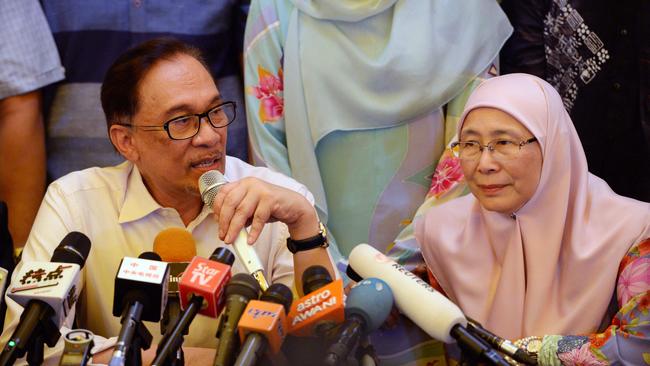Extraordinary alliance provides a chance of real democracy in Malaysia
Modern Malaysian history has surely pivoted after Anwar Ibrahim walked free from three years in prison yesterday.

Modern Malaysian history has surely pivoted after Anwar Ibrahim walked free from three years in prison yesterday, ending a sentence timed to make sure he couldn’t run in last week’s national election.
Anwar, a young-looking, lean 70, notwithstanding the trials and assaults and persecutions of more than eight years in jail in two stints since 1998, smiled and gently waved to crowds of supporters.
Then, just a couple of hours later, a press conference, with Anwar as fluent, engaged and convincing as ever.
He thanked Allah and the King of Malaysia for his pardon, thanked the Malaysian people of all races and then, in the most astonishing, historic twist of all, thanked Mahathir Mohamad, the new Prime Minister.
It was under Mahathir that Anwar, his former deputy prime minister, first went to jail on dubious sodomy charges in 1998.
Now the two are back in alliance in what must be the most complex and gothic human relationship on the planet. Next to Mahathir-Anwar, the Hawke-Keating, Howard-Costello and Turnbull-Abbott relationships were as stressful as a two-year-old’s birthday party.
Of course, Anwar has the advantage of youth. He is nearly a quarter of a century younger than the redoubtable Mahathir, who will soon turn 93.
So far, Mahathir, who has promised to hand the prime ministership to Anwar in a year or two, has been as good as his word, arranging the pardon and release of his former rival at lightning speed.
There is a chance this sequence could bring real democracy to Malaysia. Often in history the emergence from jail of a celebrated political prisoner fills a nation with hope and changes the course of its history. Think of South Africa’s Nelson Mandela, South Korea’s Kim Dae-jung, Czechoslovakia’s Vaclav Havel.
Sometimes, the hope is overdone. When they finally reach the top job, the former dissidents sometimes disappoint — think of Myanmar’s Aung San Suu Kyi.
And sometimes they are unspeakably worse — Zimbabwe’s Robert Mugabe was once a political prisoner.
Anwar is no Mugabe. He was offered a good life in America. Several times he could have walked away from Malaysian politics a free man and lived a celebrated life on the faculty of some Ivy League university as the voice of Asian liberalism.
He was once considered a dark-horse contender for UN secretary-general. Instead, he maintained his commitment to Malaysia.
And all those years, next to him in struggle, was his wife, Wan Aziza Wan Ismail, now Deputy Prime Minister.
Though she was distressed for her husband and her family, and often enough at her wits’ end, she maintained her dignity and composure. The Malaysian government never dared jail her.
It is also the case that though Anwar has been steadfast in the cause of liberalism for 20 years, he, like Mahathir, has his own authoritarian past to live down.
He was deputy prime minister when numerous opposition politicians and dissidents went to jail.
And still there must be some final twist of agonising irony that brave and effective as his last two elections campaigns were, Anwar never got the opposition over the line.
Mahathir did that, and he did it not only in opposition to the governing party, but also in opposition to the Islamic fundamentalist party, PAS, which had previously been part of Anwar’s coalition.
But today is no day to cavil. Anwar’s towering courage has won him a mighty victory.
It is a magnificent tribute to him. That the future of his nation depends once more on his relationship with Mahathir is perhaps the most extraordinary twist in a drama that has gone on now for 30 years. And just begun its most enthralling phase.



